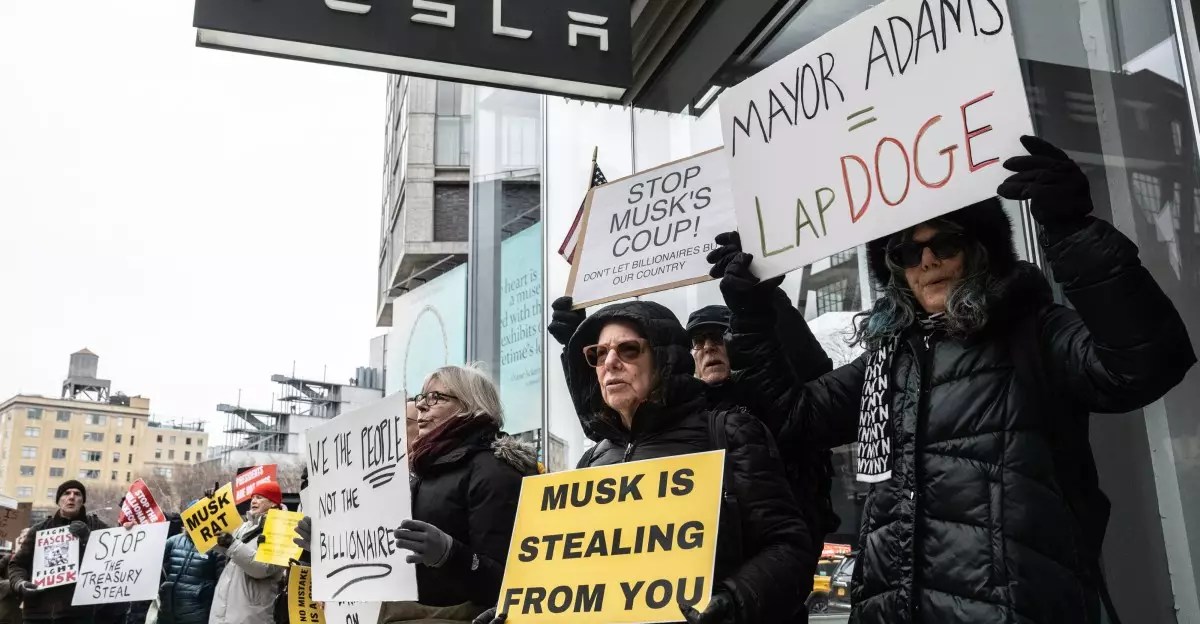In recent days, a wave of protests has swept across the United States, with demonstrators gathering outside Tesla showrooms in various cities. This movement, which has gained traction under the hashtag #TeslaTakeover, appears to be an organized response to the controversial actions and statements of Tesla’s CEO, Elon Musk. As the protests entered their second consecutive weekend, the sentiment among protestors has become increasingly vocal, with messages ranging from calls to action against Musk’s leadership to broader concerns about Tesla’s corporate integrity.
The demonstrations have occurred in both major urban centers and lesser-known communities, underscoring a widespread discontentment with the current direction of the automotive giant. Notable locations include high-profile showrooms in New York and San Francisco, while smaller yet equally passionate gatherings have taken place in places like Golden Valley, Minnesota. This dichotomy illustrates how Musk’s decisions have not only alienated a segment of his customer base but also raised apprehensions among investors regarding Tesla’s financial stability.
Amidst the protests, there are growing reports of anxiety within Tesla’s investor community. The company’s stock has seen a staggering drop of approximately 21% since the onset of the Trump administration, leading several shareholders to publicly question Musk’s focus and decision-making capabilities, particularly in his role as head of the Department of Government Efficiency. Reports from within the company suggest that some senior staff members have openly expressed that Tesla might be better positioned if Musk were to step down. This internal conflict reflects not only on the morale of the employees but also on the broader implications for the company’s future.
The rift between Musk and various stakeholders has prompted significant media scrutiny. Coverage in prominent publications reveals a growing unease about how Musk’s public comments and political associations are perceived, especially given that they often clash with the company’s core image as a progressive, eco-friendly automotive manufacturer. Losing the support of both investors and employees could pose a serious threat to Tesla’s reputation and market standing.
One of the focal points of today’s protests was outside Tesla’s showroom in Manhattan, where chants erupted against Musk and the company’s alleged association with far-right ideologies. Protestors wielded signs with slogans like “Don’t buy swasticars,” targeting what they see as a troubling complicity in extremist rhetoric. This phenomenon sheds light on how the political landscape and corporate practices increasingly intertwine, and how this may affect consumer behavior moving forward.
Similarly, public figures such as actor Alex Winter have amplified the protest voices, urging fans to reconsider their support for Tesla. The involvement of celebrities brings a unique dynamic to these demonstrations, as their platforms can significantly influence public perception and consumer choices. The grassroots nature of the protests, with various cities rallying under the shared goal of promoting accountability, demonstrates a formidable collective will.
As the protests morph into a more sustained movement, the implications could extend beyond just Tesla. The ongoing dialogue around corporate responsibility, political affiliations, and consumer activism suggests that consumers are becoming increasingly aware of the implications of their buying choices. Artists like Sheryl Crow have publicly distanced themselves from the brand, signaling that the dissatisfaction surrounding Musk’s leadership correlates directly with a call for ethical consumption.
Tomorrow’s demonstrations are set to coincide with the President’s Day holiday, promising more protests in various towns. This escalation indicates that the movement is not a fleeting moment but rather a sustained effort reflecting the public’s demand for accountability in corporate leadership. As citizens both inside and outside Tesla brace for the next wave of events, one can only wonder what lasting impacts this growing discontent might have on Musk’s empire.
What started as localized protests has evolved into a nationwide dialogue about integrity, leadership, and the future of not just Tesla but also corporate America as a whole. Public sentiment is a powerful force, and as demonstrators continue to unite in their calls for change, the repercussions for Musk and Tesla remain to be seen.


Leave a Reply